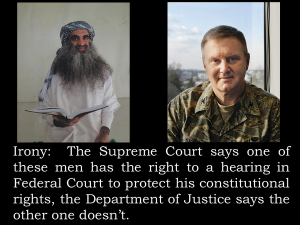 Barack Obama has a preternatural preference for ivory tower elites from Harvard when it comes to judicial and executive branch appointees, and David Barron is the latest example. The White House is in the final stages of an all out push to insure David Barron gets confirmed to a lifetime Article III seat on the First Circuit.
Barack Obama has a preternatural preference for ivory tower elites from Harvard when it comes to judicial and executive branch appointees, and David Barron is the latest example. The White House is in the final stages of an all out push to insure David Barron gets confirmed to a lifetime Article III seat on the First Circuit.
In this regard, Mr. Barron has gotten exactly the kind of fervent support and back channel whipping the Obama White House denied Goodwin Liu, and refused to give to the nominee at OLC that David Barron stood as the designated and approved Obama acting placeholder for, Dawn Johnsen.
It turns out Mr. Obama and his White House shop really can give appropriate support to nominees if they care, which seemed to be a trait entirely lacking earlier in the Obama Presidency. And by giving the ill taken legal cover to Mr. Obama for the extrajudicial execution of American citizens, that Obama had already attempted once without, Mr. Barron certainly earned the support of the Obama White House.
It would be wonderful if Mr. Obama were to give support to candidates for judicial seats and key legal agencies who protect the Constitution instead of shredding it for convenience, but it appears to not be in the offing all that consistently. Obama has never been the same since blowback from the release of the Torture Memos when he first took office. Even Federal judges like Mary Schroeder and Bill Canby who, less than a month after Obama took office, were stunned by the about face, and wholesale adoption, by Obama of the Bush/Cheney security state protocols. From a New York Times article at the moment:
During the campaign, Mr. Obama harshly criticized the Bush administration’s treatment of detainees, and he has broken with that administration on questions like whether to keep open the prison camp at Guantánamo Bay, Cuba. But a government lawyer, Douglas N. Letter, made the same state-secrets argument on Monday, startling several judges on the United States Court of Appeals for the Ninth Circuit.
“Is there anything material that has happened” that might have caused the Justice Department to shift its views, asked Judge Mary M. Schroeder, an appointee of President Jimmy Carter, coyly referring to the recent election.
“No, your honor,” Mr. Letter replied.
Judge Schroeder asked, “The change in administration has no bearing?”
Once more, he said, “No, Your Honor.” The position he was taking in court on behalf of the government had been “thoroughly vetted with the appropriate officials within the new administration,” and “these are the authorized positions,” he said.
Make no mistake, from my somewhat substantial knowledge of Mary Schroeder, that was the voice of shock and dismay. But it was an early tell of who and what Barack Obama, and his administration, would be on national security issues from there forward. And so, indeed, it has been.
What was unconscionable and traitorous to the rule of law and Constitution for Obama, and the Democratic majority in the Senate, under George Bush is now just jim dandy under Barack Obama. It is intellectual weakness and cowardice of the highest order.
So we come back to the case of David Barron. Frankly, it is not hard to make the argument that what Barron has done is actually worse than the travesties of John Yoo and Jay Bybee. As unthinkable, heinous and immoral as torture is, and it is certainly all that, it is a discrete violation of domestic and international law. It is definable crime.
But what David Barron did in, at a minimum, the Awlaki Targeted Kill Memo (there are at least six other memos impinging on and controlling this issue, at a minimum of which at least one more is known to be authored by Barron, and we don’t even deign to discuss those apparently), was to attack and debase the the very foundational concept of Due Process as portrayed in the Bill of Rights. Along with Habeas Corpus, Due Process is literally the foundation of American criminal justice fairness and freedom under our Constitution.
David Barron attacked that core foundation. Sure, it is in the so called name of terrorism today, tomorrow it will justify something less in grade. And something less the day after. Such is how Constitutional degradation happens. And there is absolutely nothing so far known in Mr. Barron’s handiwork to indicate it could not be adapted for use domestically if the President deems it so needed. Once untethered from the forbidden, once unthinkable Executive Branch powers always find new and easier uses. What were once vices all too easily become habits. This is exactly how the once proud Fourth Amendment has disappeared into a rabbit hole of “exceptions”.
This damage to Due Process occasioned by David Barron can be quite easily argued to be more fundamental and critical to the Constitution, the Constitution every political and military officer in the United States is sworn to protect, than a temporally limited violation of criminal statutes and international norms on torture as sanctioned by Yoo and Bybee. But it is not treated that way by cheering Dems and liberals eager to confirm one of their own, a nice clean-cut Harvard man like the President, to a lifetime post to decide Constitutional law. What was detested for Jay Bybee, and would certainly be were John Yoo ever nominated for a federal judgeship, is now no big deal when it comes to David Barron. Constitutional bygones baybee; hey Barron is cool on same sex marriage, what a guy! Screw Due Process, it is just a quaint and archaic concept in a piece of parchment paper, right?
If the above were not distressing enough, the Barron nomination was supposed to, at a minimum, be used as leverage to get public release of the Barron handiwork legally sanctioning Mr. Obama to extrajudicially execute American citizens without a whiff of Due Process or judicial determination. Did we get that? Hell no, of course not. A scam was run by the Obama White House, and the Senate and oh so attentive DC press fell for it hook, line and sinker. We got squat and Barron is on the rocket path to confirmation with nothing to show for it, and no meaningful and intelligent review of his facially deficient record of Constitutional interpretation.
Barron cleared cloture late Wednesday and is scheduled for a floor vote for confirmation today, yet release of the “redacted memo” is nowhere remotely in sight. This framing on Barron’s nomination, irrespective of your ultimate position on his fitness, is a complete and utter fraud on the American citizenry in whose name it is being played. And that is just on the one Awlaki Memo that we already know the legal reasoning on from the self serving previous release of the “white paper” by the Administration. Discussion of the other six identified pertinent memos has dropped off the face of the earth. Booyah US Senate, way to do your job for the citizens you represent! Or not.
Personally, there is more than sufficient information about David Barron’s situational legal, and moral, ethics in the white paper alone to deem him unfit for a lifetime Article III confirmed seat on a Circuit Court of Appeal.
But, even if you disagree and consider Barron fit, you should admit the American citizenry has been ripped off in this process by the Democratically led Senate, and an Obama Administration who has picked a dubious spot to finally get aggressive in support of one of their nominees.
If Goodwin Liu and Dawn Johnsen, two individuals who had proven their desire to protect the Constitution, had received this kind of support, this country, and the world, would be a better place. Instead, Mr. Obama has reserved his all out push for a man who, instead, opted to apply situational ethics to gut the most basic Constitutional concept of Due Process. That’s unacceptable, but at a minimum we should have the benefit of proper analysis of Barron’s work before it happens.
 There has been a lot of commotion over Wednesday’s decision by the US Trademark Trial and Appeal Board to cancel several trademark registrations of the Washington Redskins originally recognized back in the 1960’s by the United States Patent and Trademark Office (PTO). The full decision is here. It is quite long, detailed, and, at least facially, pretty compelling in its finding that the trademarks are “disparaging to Native Americans”.
There has been a lot of commotion over Wednesday’s decision by the US Trademark Trial and Appeal Board to cancel several trademark registrations of the Washington Redskins originally recognized back in the 1960’s by the United States Patent and Trademark Office (PTO). The full decision is here. It is quite long, detailed, and, at least facially, pretty compelling in its finding that the trademarks are “disparaging to Native Americans”.



